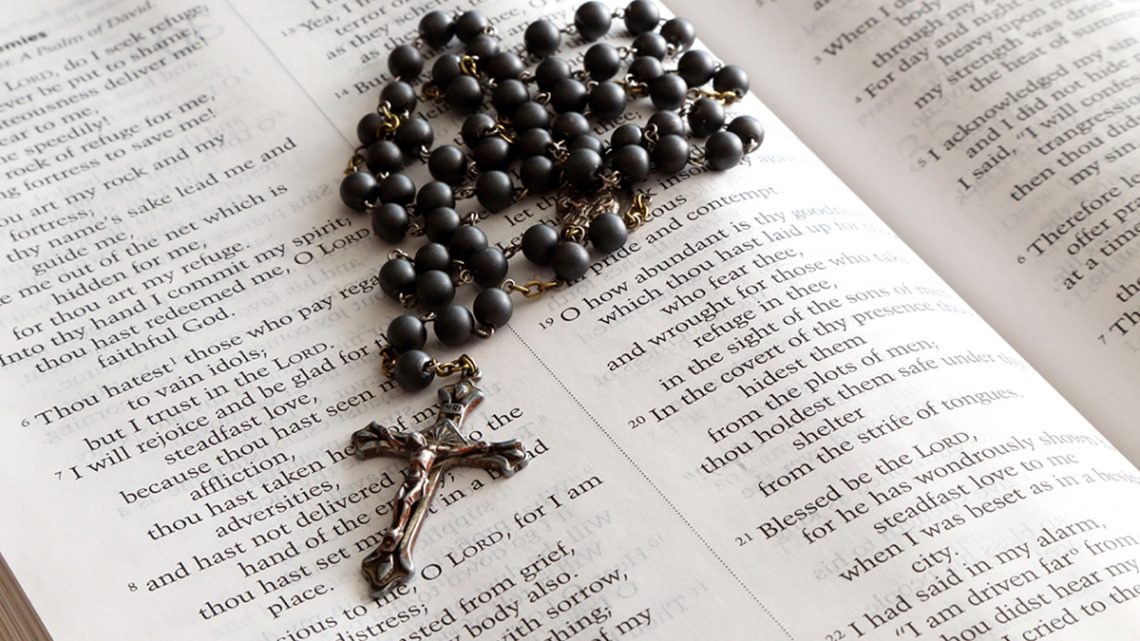The Rosary is much like our precious photos or other mementos: it’s a simple, tangible way of keeping the most important person in our life, Jesus, front and centre.

Most of us have at least a few precious photographs in our homes—or perhaps on our phones! They keep the most important people and events of our lives in our minds, so that they’re not just distant memories but a part of who we are today. The Rosary is much like our precious photos or other mementos: it’s a simple, tangible way of keeping the most important person in our life—Jesus—front and centre. But because the Rosary is a prayer, not just an object, it actually connects us to Jesus and helps us to deepen our relationship with Him.
Pope Saint John Paul II wrote that the Rosary is a way of “remembering Christ with Mary,” who knows Him as only a mother can. St Luke tells us that Mary continually meditated on the mysteries in her Son’s life and “pondered all these things in her heart.” (Luke 2: 19)
We do something similar when we recall important memories and share them with others, gradually developing a different perspective on past events as we mature and see them in a different light. Think of how differently most people see their parents once they have children of their own! By reflecting on the events of Jesus’ life in the Rosary, we can also grow in our understanding of them.
Just as learning from our special memories comes naturally and doesn’t involve any formal study, so the Rosary is “simple yet profound” – again, in the words of Pope Saint John Paul II. It is an unchanging series of the most basic prayers of our faith repeated while thinking about the most important events in the life of Jesus and, by extension, of his mother Mary. It doesn’t require a vast knowledge of the Bible or the Catechism of the Catholic Church—but those of us who enjoy reading and studying will find that it will only enrich our recitation of the Rosary. For music lovers, you may prefer to think of the rosary as the background music while our focus is on that moment is the life of Christ.
The reason the Rosary is so “profound” is simply that it originates in God’s own Word. Popes Pius XII and Paul VI have called it “the compendium of the entire Gospel” (or, the Gospel on a string) because it encompasses all the highlights of the history of our salvation – namely, the Joyful, Luminous, Sorrowful, and Glorious Mysteries.
The Joyful Mysteries focus on the events surrounding Christ’s Incarnation, the Word becoming flesh and growing up in a human family.
The Luminous Mysteries show us some of the major events of Jesus’ public life, His preaching, and the establishment of some of the Sacraments.
The Sorrowful Mysteries take us through the suffering and death He endured out of love for us.
The Glorious Mysteries include not only Jesus’ triumph over death but also the formation of the Church and Mary’s experience of her own new life in Christ.
The prayers we repeat as we meditate on these Mysteries are also deeply rooted in the Bible. As Pope John Paul I explained:
“The Rosary is a procession of Our Fathers, the prayer taught by Jesus; of Hail Marys, the salutation of God to the Virgin by means of the Angel; of Glory Bes, the praise of the Most Holy Trinity.”
These prayers are so basic to our faith and so rich in meaning that we can never repeat them too often or get tired of them.
Whether we’re new to the Rosary or have been praying it for years, we should try to meditate on the Mysteries of the Rosary in a way that lets us really tap into its riches and keeps us in touch with the most important person in our lives – Jesus. Some people find it helpful to use a pamphlet with Bible verses or pictures related to the Mysteries; others need nothing but the prayers themselves. Some people enjoy praying the Rosary in a group; others prefer to go at their own pace. Just saying one decade of the rosary daily, for some, slowly and with great attentiveness, might be their preference. Everybody’s approach to praying the Rosary is a little different, just like everybody’s relationship with Jesus and His Mother is unique.
When we spend the time it takes to pray a Rosary in the company of our Saviour and His Mother, we start to find that they become a bigger part of our lives and that the events of their lives become part of our own. We learn how to live as mature Christians by being with them and observing how they lived, just as we learned to be mature adults by living with our parents or other guardians. None of us is obligated to pray the Rosary, but when we know that it’s not a boring series of prayers but a way of deepening our relationships with people who already love us more than words can say—Jesus and Mary—it becomes something that we want to do. It’s been my personal experience that it truly is the Gospel on a string.
Sr Johanna Marie Melnyk, OSB
Adapted from a retreat on the Rosary at Turvey Abbey, 18 May 2013.